May 23, 2025 | 20:52 GMT +7
May 23, 2025 | 20:52 GMT +7
Hotline: 0913.378.918
May 23, 2025 | 20:52 GMT +7
Hotline: 0913.378.918
The delegation of the Federal Ministry for Economic Cooperation and Development (BMZ), led by Dr. Andreas Foerster, visited German-Vietnamese cooperation projects implemented in Kien Giang province. To be more specific, the delegation visited the Green Innovation Center (GIC) project at Channel 7A Agricultural Cooperative, Thanh Dong A commune, Tan Hiep district. At the same time, there was an exchange and discussion with leaders of the Kien Giang Department of Agriculture and Rural Development and Farmers' Organization about the results of the GIC project.
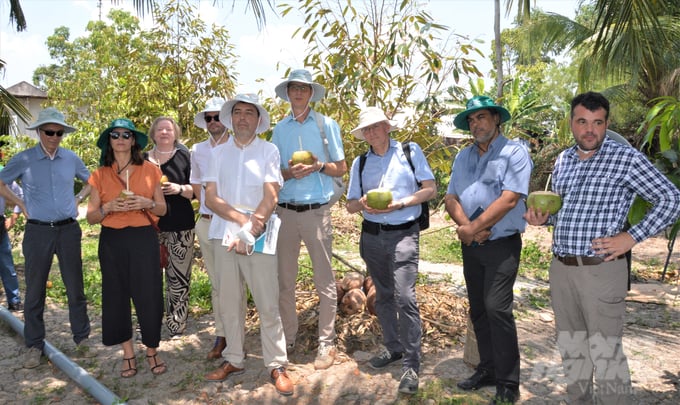
The delegation of the Federal Ministry for Economic Cooperation and Development (BMZ) led by Dr. Andreas Foerster fif5th from the right) during a visit to Germany-Vietnam cooperation projects being implemented in Kien Giang province. Photo: Trung Chanh.
Reporting to the delegation, Mr. Huynh Thanh Liem, Director of the Rural Development Sub-Department of Kien Giang province, said that Kien Giang is a province in the Mekong Delta, with an agricultural land area of 575,000 hectares, producing more than 283,000 hectares of rice for two crops, and 104,320 hectares of rice - shrimp, having the highest rice output in the region (4.3 - 4.5 million tonnes/year).
Kien Giang is one of the six provinces supported by the GIC project in the Mekong Delta, but there remain many significant difficulties and challenges the agricultural sector and farmers have to face. It includes the impact of climate change and sea level rise affecting the rice growing environment. Since 2008, the long dry season has caused drought and severe water scarcity on a large scale, with historic shortages in 2016 and 2020. In coastal areas, sea level rising due to climate change is accelerating saltwater intrusion.
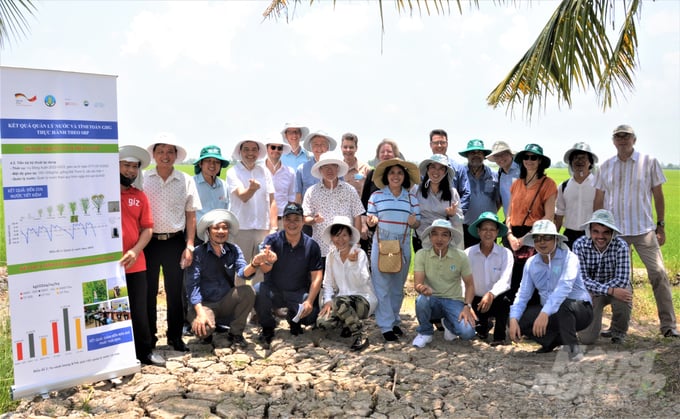
The German Ministry of Economy and Development Cooperation delegation highly appreciated the results achieved by the GIC project at Channel 7A Agricultural Cooperative, especially the apparent change in the ecological environment. Photo: Trung Chanh.
The GIC project has assisted Kien Giang in solving the above problems through solutions to develop sustainable rice value chains. The GIC project helps Kien Giang, through local subsidies with provincial partners - Agricultural Extension Center, to implement a technical package that includes training on SRP, organic production, IPM, and environmental protection for rice cultivation, building demonstration model SRP including technological improvements SRP, AWD, IPM, MRL, and organic production model for shrimp-rice.
The GIC project supports Kien Giang through local subsidies with a provincial partner - the Sub-Department of Rural Development and the Agricultural Extension Center to build capacity for households and small-scale cooperatives. The Farmer Business School (FBS) will be provided to small-scale families to change their entrepreneurial mindset and build capacity in business planning and development, financial management, risks, and sustainable production planning with climate change.
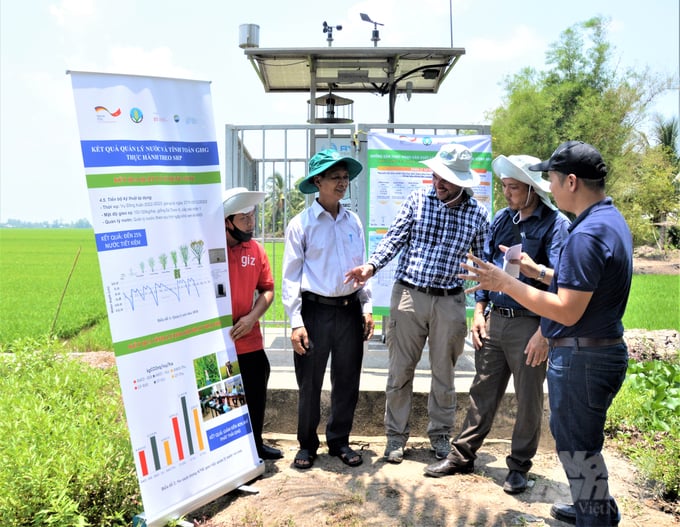
The intelligent pest monitoring station is supported by the GIC project for Channel 7A Cooperative, helping to manage integrated pests effectively and limiting the use of pesticides for prevention. Photo: Trung Chanh.
Business capacity building for cooperatives will also be provided with the goal of improving cooperative governance and management, business planning, financial planning, and marketing for cooperatives. It helps cooperatives increase their competitiveness and revenue when participating in the rice value chain. At that time, the cooperatives have enough capacity to develop business plans.
Support infrastructure investment and technology transfer into production to increase economic efficiency, protect the health of producers, and promote the mechanism. Reduce greenhouse gas emissions from rice farming by adopting innovative practices (AWD). Increase economic efficiency by reducing production costs, increasing selling prices, and increasing income.
Channel 7A Agricultural Cooperative in Kien Giang is one of 90 rice farmer organizations selected for support by the GIC project. Mr. Do Duy Nguyen, Director of Channel 7A Agricultural Cooperative, said that the Cooperative was established in 1997 and currently has 336 members, with an area of 640 hectares of rice land. It provides services to cooperative members, including pumping, tilling, supplying rice seeds, supplying agricultural materials, harvesting, and selling products to produce three rice crops/per year.
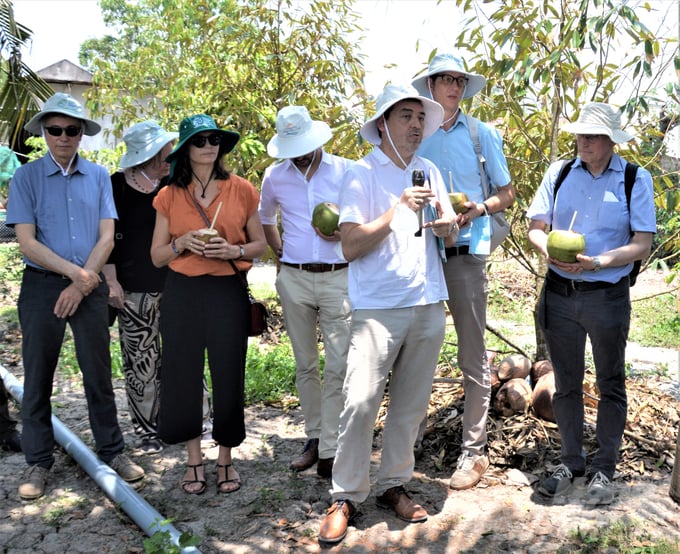
Dr. Andreas Foerster (3rd from right) asked the leader of Channel 7A Cooperative about SRP rice production, how to sell rice internationally, and solutions to retain young people in farming. Karma. Photo: Trung Chanh.
Participating in the GIC project, Channel 7A Agricultural Cooperative is supported to support innovative agricultural practices to increase profits and help reduce negative impacts and protect the rice-growing environment. GAP good farming practice training with SRP rice standards, including maximum residue of pesticides (MRL), rational and economical use of water resources, fertilizers, agrochemicals, and gas, reduces greenhouse emissions. Furthermore, the project supports business packages and market linkage improvements.
"Now that we are standing here, I see the model of rice fields is incredible and brings good results. What will the future of the Cooperative look like in the next five years?" Dr. Andreas Foerster asked the Cooperative Director Do Duy Nguyen.
Cooperative director Do Duy Nguyen replied with confidence: "Joining the GIC project, we were trained and trained, so we boldly changed production methods, minimizing the environmental impact. Enzymes are used to help improve soil, increase the use of organic fertilizers, and gradually reduce fertilizers and toxic chemicals to protect the environment. In the coming years, we will expand the organic production area, striving to achieve organic certification for rice soon. Thereby helping increase the quality of agricultural products, better selling prices, and higher incomes".
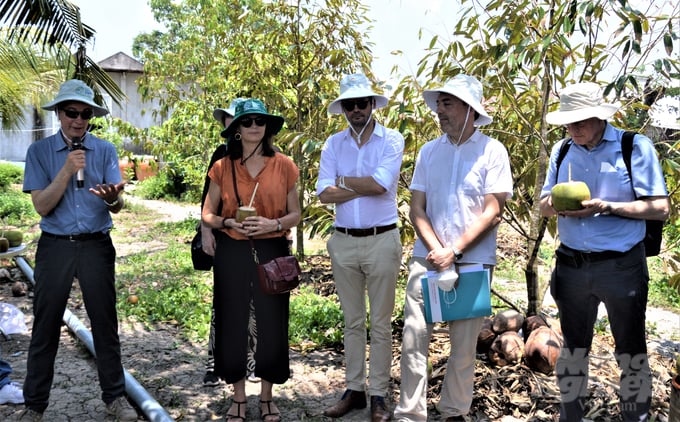
A member of the German Ministry of Economic Affairs and Development Cooperation (BMZ) delegation asked the leader of the Channel 7A Cooperative about the results that the GIC project has brought, such as changing production methods, increasing incomes, preserving revenue, and environmental protection. Photo: Trung Chanh.
The representative of the delegation of the German Ministry of Economy and Development Cooperation (BMZ) continued to ask questions about how Channel 7A Agricultural Cooperative sells rice to the international market, considering that the cooperative has produced SRP rice.
Director of Cooperative Do Duy Nguyen replied: We apply the SRP production process, so the quality of rice is excellent, meeting the standards of international export, even to fastidious markets. To sell rice, the cooperative cooperates with local businesses, specifically Loc Troi Group, to purchase, process, and export. However, only 40 hectares of rice in the 2022-2023 winter-spring crop is linked to consumption through business contracts. Most of the remaining area still has to be sold through the system of traders. The consumption problem is unfortunate and not as expected of the members.
“Farmers, especially young people, are now leaving their hometowns and fields to do other jobs, mainly as workers in industrial zones. What solutions do the cooperative leaders have to retain young people to stay and devote to agriculture?” The delegation's representative continued.
Director of the Cooperative Do Duy Nguyen said this question is complicated. He wished that the German Ministry of Economy and Development Cooperation (BMZ), the GIC Project, through the local government, would give more support to the Organization's farmers, such as investment in infrastructure, machinery, and equipment for production. Support the project of entrepreneurship through FBS training courses and improve market access. Especially the innovative agricultural practice process, helping to produce greener and cleaner shows, protect the rice environment and achieve higher efficiency and better income, will retain enthusiastic young people in agriculture.
The GIC project aims to help farmers apply sustainable and responsible farming standards in using pesticides and fertilizers to stabilize the ecosystem for the rice production area and adapt to climate change, Help manages water use, and increase the efficiency of fertilizer and pesticide use efficiency when applying the IPM process. From there, contribute to reducing negative environmental impacts to promote efficient use of natural resources, restore capacity with the rice farming system, and look for partners to link the market for output and stability for producers.
Translated by Ha Phuc

(VAN) The People's Committee of Tra Vinh province has approved an adjustment to the investment policy for the Green Hydrogen Plant project, increasing its area to approximately 52.76 hectares.
![Reducing emissions from rice fields: [2] Farmers’ commitment to the soil](https://t.ex-cdn.com/nongnghiepmoitruong.vn/608w/files/news/2025/05/05/dsc08881jpg-nongnghiep-140632.jpg)
(VAN) Clean rice cultivation model in Thuong Tan commune, Bac Tan Uyen district, is assisting local residents in achieving sustainable agriculture by substantially reducing costs, increasing productivity, and protecting the environment.

(VAN) At the conference to disseminate Resolution No. 68, AgriS introduced its digital agricultural ecosystem and reaffirmed its commitment to accompanying the Government in promoting private sector development and sustainable agriculture.

(VAN) 'Blue Ocean - Blue Foods' initiative is designed to restore marine ecosystems and establish sustainable livelihoods for local communities by cultivating a minimum of 1,000 hectares of cottonii seaweed in the first three years.
/2025/05/21/4642-3-112707_603.jpg)
(VAN) The V-SCOPE project has made direct contributions to three out of six pillars of the Comprehensive Strategic Partnership between Vietnam and Australia.

(VAN) Facing the threat of rabies spreading to the community, Gia Lai province urgently carries out measures to vaccinate dogs and cats on a large scale.

(VAN) Disease-free livestock farming not only protects livestock herds but also stabilizes production and livelihoods for many farmers in Tuyen Quang.